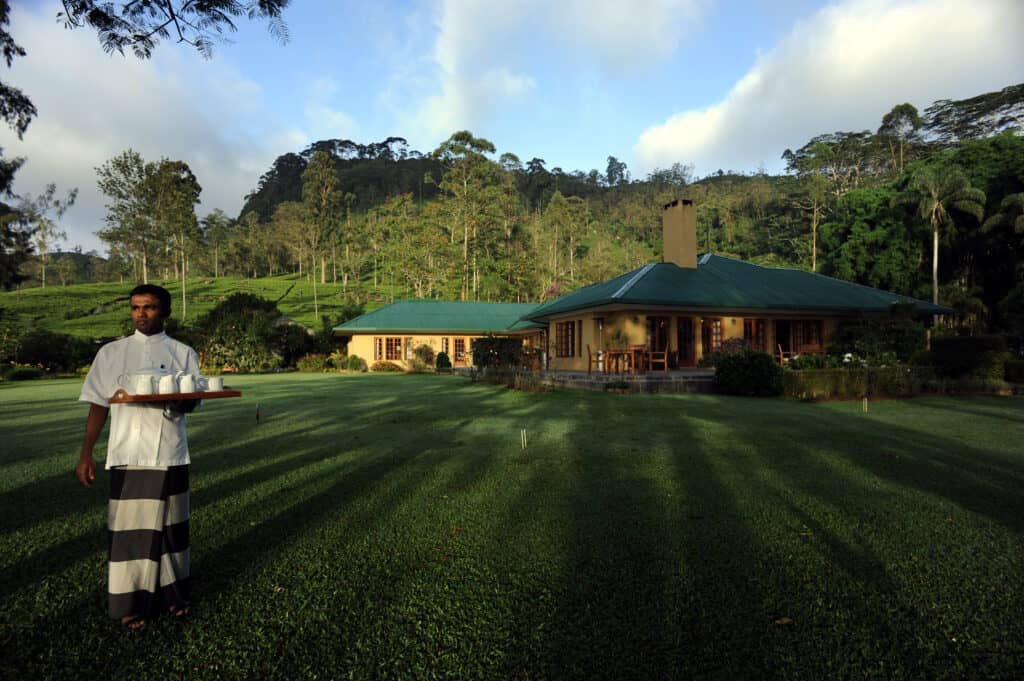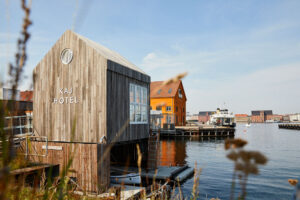
FORESTIS – A Luxury Eco-Conscious Retreat
FORESTIS is a luxury, eco-conscious retreat nestled in the beautiful Dolomite Mountains of Italy.
Sri Lanka
Mood of Living November 19, 2018
Resplendent Ceylon, luxury resorts in Sri Lanka, traces back to the 1980s, when Merrill Fernando founded Dilmah Tea, Sri Lanka’s sole producer-owned tea brand. It was not until 2005, however, that Merrill and his son, Malik, expanded beyond tea production and into the hospitality industry with the opening of Ceylon Tea Trails. A luxury hotel with stunning views of mountains and tea fields, Ceylon Tea Trails transcends being just a beautiful location, it offers a magical customer experience. Since then, they have opened two more luxury hotels under the company Resplendent Ceylon, each of which immerses visitors in a celebration of Sri Lanka’s vibrant culture, beautiful natural environment, and, of course, its world-renowned tea.
Mood of Living: What is your hometown?
Malik Fernando: Colombo, Sri Lanka.
Merrill Fernando: Colombo, Sri Lanka.
MoL: Where did you go to school?
Malik: At Stonyhurst in the UK and Babson in Boston, graduating with an undergraduate business degree.
Merrill: I was at Maris Stella, a Catholic school in then Ceylon.
MoL: What work did you do before your current job?
Malik: The family business was my first job! I declined an internship at McKinsey to return to Sri Lanka to work with my father at Dilmah.
Merrill: I worked for a petroleum company in Ceylon briefly before becoming a tea taster in 1952.
MoL: What was your first job?
Malik: I managed operations at Dilmah for two decades before creating the Resplendent Ceylon brand, creating a small collection of unique luxury boutique hotels inspired by our love of tea.
Cape Weligama, one of Resplendent Ceylon’s luxury properties.
MoL: Tell us about your family business, Dilmah Tea. How did you decide to open a tea company? What about tea in particular appealed to you? How did you build a successful company from nothing?
Merrill: Sri Lanka’s tea has been acclaimed as the best, but much of it was bulk-exported abroad and the serene beauty of the tea region was not widely explored by tourists. Early in my career, I resolved to change the way the Sri Lankan tea industry operated, creating the world’s first producer-owned brand – one that would offer the finest teas to consumers whilst providing a better deal to producers. Thus, Dilmah Tea was born in 1988 as the pioneer to grow, pick and pack at source, branded under a local brand for distribution to tea drinkers overseas.
MoL: What sets Dilmah Tea apart from other tea companies? How has it changed the tea industry? How would you summarize the company’s philosophy?
Merrill: At Dilmah, we pick, process and package the tea at source in Sri Lanka, ensuring profits remain in Sri Lanka and help local communities, as well as promoting freshness and high quality of single-origin Ceylon tea. I have always believed that the greatest gift is the gift of giving – in sharing and caring, we make our business a human service. Since the early days, our earnings have been shared amongst our workers, the differently abled and the wider community. Our business was established on the principle that success is a blessing to be shared. Our ethos is ‘business as a matter of human service’, which is fulfilled through the philanthropic work of the MJF Charitable Foundation and Dilmah Conservation. A minimum 10 percent of earnings from Dilmah and Resplendent Ceylon’s hotels are diverted towards humanitarian and environmental interventions, impacting hundreds of thousands of people across Sri Lanka since the launch of the business.
MoL: What kind of tea is in vogue right now?
Merrill: Tea in general is very much in vogue with speciality teas driving demand. Tea offers such a wide variety, like wine, so that there is a tea for every taste – many like drinking different teas at different times of the day. This simply isn’t possible with coffee!
Malik: Our Silver Tips white tea which is just the bud, air dried, is popular as are Ceylon green teas which offer a different experience from typical East Asian green teas.
MoL: What relationship does Dilmah have with those employed in its factories and plantations? How is their well-being taken into account?
Merrill: Our workers have been at the heart of our business since day one, with our profits contributing towards improved housing, education and healthcare for workers, their families and the wider community.
MoL: Where did the name “Dilmah Tea” come from?
Merrill: Dilmah is named after my two sons, Dilhan and Malik.
Merrill Fernando and his family.
MoL: Where did you each grow up? How did your upbringing influence the path of your career and life? Malik, did you always plan to go into business with your father, or was that a decision you made later on?
Malik: I grew up in Colombo but was sent away to boarding school in England at the age of 10, as a semi Marxist regime made things difficult in Sri Lanka at the time. After my secondary education, I worked in the business for a year and then did a business degree in the US. I always expected to go into the family business together with my brother. With a brand named after us, we did not consider any other option!
Merrill: I grew up outside Colombo. I remember my mother taking care of the disadvantaged in that small village, which had a lasting impression on me. I was among the first Sri Lankans to enter the then British dominated tea trade; I soon realized that the colonial model of trade needed to change and vowed to one day create a fully Sri Lankan owned brand of tea.
MoL: What is the relationship between Dilmah Tea and Resplendent Ceylon? Whose idea was it to expand beyond tea and into hospitality? What has been the most challenging about adjusting to working in this new industry? How did your previous experience help you prepare for running hotels?
Malik: In 2001, when the Sri Lankan government announced a ceasefire in the long-running conflict, we began to receive letters from fans of Dilmah Tea around the globe. They were intrigued by our beautiful country and delicious tea; they wanted to visit Sri Lanka to experience the unique culture for themselves.
Merrill: Alongside my sons, Malik and Dilhan, we began running unofficial tea tours, with visitors staying in our tea planters’ bungalows and estate managers’ homes, touring the factories and plantations with our team. Word spread and our accidental hotel business began!
Malik: We renovated four historic tea planters’ bungalows – built between 1888 and 1950 – within the tea estates near Castlereagh Lake. In 2005, Ceylon Tea Trails officially opened as a unique ‘hotel’ concept, allowing guests to feel as though they have travelled back in time to old Ceylon. We wanted our guests to experience graceful living in the pristine surroundings of an emerald carpeted tea estate – awoken each day by a butler serving ‘Bed Tea’, an age-old institution, as their bath is drawn and curtains opened to reveal the misty valley below. At its core, Ceylon Tea Trails is a celebration of our country’s greatest export and my family’s great love – tea.
Merrill: The movement from focusing purely on tea to the creation of our hospitality arm, Resplendent Ceylon, has been an organic one, focused purely on impeccable service and authentic Sri Lankan experiences.

MoL: Tell us about the Dilmah School of Tea. How did the idea to open this come about? What do students learn at this school? Why is it important to pass on this knowledge?
Merrill: Dilmah has traditionally taken the lead in bringing innovation to the tea category that has suffered decline as a result of commoditization by major brands. Tea was considered dull.
Malik: The School of Tea inspires passion in tea through knowledge of the artisanal aspects of tea amongst hospitality professionals, tea aficionados and consumers. The events foster greater interest in quality tea, and greater respect for this healthy, natural and versatile beverage.
MoL: Do you think that family-run businesses have any advantages over other businesses? What challenges do they face? Do you see Dilmah Tea and Resplendent Ceylon being run by your descendants one day?
Merrill: Family businesses mostly have a long-term view without hungry shareholders to please on a short-term basis; they have a greater focus on maintaining quality. Workers are often part of the larger family and have access to the owners in resolving a problem. Challenges can arise when family members are disunited!
Malik: Absolutely. Dilmah and Resplendent will be run by future generations. We consider it a family mission for Sri Lanka to highlight and promote its core tea and tourism product.
MoL: Describe your first encounter with Castlereagh, one of the bungalows that composed your first hotel, Ceylon Tea Trails. What was the history of the building, and what was the process of transforming it into a hotel? Did you have any idea then that you would one day own an entire company of hotels?
Malik: When I first walked into Castlereagh, it was in a very sorry state — little more than a shell, with holes in the roof and cows wandering through the rooms. However, we could see the promise. The building had an incredible location on the edge of Castlereagh Lake, in the middle of the working tea estate, and had historically been home to the estate’s managers. Over time, we developed four bungalows around the estate, with an additional bungalow and private one-bedroom cottage added in 2016. We never planned to move into hospitality — we refer to ourselves as accidental hoteliers — but the demand for a unique luxury hotel brand was there. In 2014, we opened our second property, Cape Weligama on the island’s south coast, followed by luxury safari camp Wild Coast Tented Lodge near Yala National Park in 2017.
MoL: What is your vision for Resplendent Ceylon?
Malik: We want to offer the discriminating traveler a remarkable circuit across Sri Lanka, with a range of authentic experiences. This ‘best of Sri Lanka’ circuit now features three distinctively original resorts, connected by a thread of peerless service. All are members of the Relais & Chateaux association. We are planning two more resorts in iconic spots to complete the circuit.
All of Resplendent Ceylon’s properties offer stunning views of the Sri Lankan landscape.
MoL: The website for Ceylon Tea Trails refers to it as the world’s first tea bungalow resort.What does this mean? How is tea incorporated into guests’ experiences? Whatsignificance does tea have to you, and to the people of Sri Lanka?
Malik: Ceylon Tea Trails consists 27 bedrooms, spread between fiveformer teaplanters’bungalows and a private one-bedroom cottage.Our love of tea can be seen in every facet ofa guest’s experience, from the lush tea fields surrounding the estate, to the complimentary teafactory tours, elegant afternoon cream teas, and tea-inspired cuisine at every meal. Tea is thelifeblood of Sri Lanka, arriving in the country after a devastating coffee blight brought theeconomy to its knees. Light, golden and fragrant, Ceylon tea is unique and highly esteemedamongst tea lovers.
MoL: Where is Wild Coast Tented Lodge located? What is appealing to guests about this region of the world, and how does the architecture and design of the lodge reflect its surroundings? Who is the architect? What does this unique form of lodging offer guests?
Malik: Wild Coast Tented Lodge is located on an unspoilt stretch of beach on the fringes of Yala National Park in south east Sri Lanka. This is Sri Lanka’s largest national park, and home to staggering biodiversity including Sri Lankan leopards, elephants, sloth bears and endless species of bird. The resort’s organic architecture, by Nomadic Resorts, integrates seamlessly into the site, which comprises dryland forests that merge into the rugged sandy coastline overlooking the Indian Ocean. The five-star lodge, with 28 luxury tents, is designed to give visitors an intimate experience of Yala, celebrating the flora, fauna and culture of the area, with minimal intrusion on the landscape. Local influences were especially important, from vernacular traditions and materials to community involvement. The bamboo clad restaurant and bar blends into the boulder-scattered landscape and are surrounded by a large free form pool overlooking the beach. The tents are clustered around water holes in a design which mimics a leopard’s paw.
MoL: What activities are available to guests at the hotel, and nearby?
Malik: Safari forms the heart of the Wild Coast experience, with guests invited on daily game drives with our expert guides into the least-discovered sections of Yala National Park. They can also discover local fishing villages, temples and places of pilgrimage.
MoL: What is the dining experience at WIld Coast Tented Lodge like? What is served? How is sustainability taken into account in the dining experience?
Malik: We make the most of the island’s incredible natural bounty with delicious local produce, freshly-caught fish and the most fragrant spices, served in spectacular natural surroundings. For a special occasion, our private beachside feasts are unbeatable!
Resplendent Ceylon’s properties offer a myriad of opportunities to connect closely with nature.
MoL: Tell us about the spa experience at Wild Coast Tented Lodge.
Malik: Our unique spa pods offers bespoke, tailored treatments using indulgent, fragrant products inspired by Sri Lanka’s world-renowned spices and tea. From a post-safari massage to ease aching muscles from an early-morning game drive, to a traditional ayurvedic island journey, there is a treatment to suit every guest.
MoL: Describe your current project, Sigiriya Resort. When is it set to open? What do you envision for this hotel? Where is it located? What will be unique about what it offers its guests?
Malik: Our Sigiriya property — yet to be named — is scheduled to open towards the end of 2020. The hotel will be located on the banks of a lake and elevated amongst the treetops in the heart of the famous Cultural Triangle, close to the iconic World Heritage Sigiriya rock. The rooftop swimming pool will be the longest in Sri Lanka, with breathtaking views of the lake and mountains.
MoL: Do you have any other future projects in the works?
Malik: The Resplendent Ceylon collection will eventually include a beachside property on the little-visited east coast.
MoL: What was it like to run a business during Sri Lanka’s civil war? How did the war affect business for you, and for others in the hospitality and industries? Did the conflict have any impact on your perspective or attitude towards the work you do?
Merrill: The conflict started in the 80s initially at a low intensity and then became quite ferocious – the fighting was in the north-east but there were regular bomb attacks in Colombo. The tourism industry was badly affected, the tea business less so. The country stood still with terrible human impact on all sides.
Malik: We stoically focused on defending the business and promoting Sri Lanka overseas with Dilmah at a time when the country’s image was badly tarnished.
MoL: In recent years, Sri Lanka has experienced a boom in tourism. What have been the positive impacts of this? Have there been any negative impacts? What do you think is responsible for this surge?
Malik: Tourism experienced massive pent-up demand post-war from around 2010. The positive is that many more were employed in the industry and monies have flowed down to all levels. The negative is that there has been growth in hotel infrastructure some of which impacts the pristinity that tourists initially came for. However this is inevitable and is reasonably well managed with a few exceptions as we have fairly strict environmental and development controls. It is Sri Lanka’s beauty and the genuine warmth of people that has led to this growth.
MoL: What reputation do you think Sri Lanka has among travelers? Do you think your hotels have helped more people see Sri Lanka as an appealing luxury tourist destination? Has your work as a hotel owner changed the way you see the island?
Malik: Travellers love their stays in Sri Lanka, as an authentic destination with widely contrasting areas; from the tea country to the beaches, the historic areas and safari parks – we are about 6 countries in one. Then the amazing food and warm people. However, it has not been seen as a luxury destination before Resplendent Ceylon started promoting its circuit of 3 Relais & Chateaux resorts. Previously most of the accommodation was midmarket and Resplendent Ceylon’s focus on unique locations with extraordinary resorts has helped create demand for luxury travel here. Whenever I travel around the country, I look to see what specific angles of that area and locations would attract the discerning traveller. This has led to the development of our next two resorts in Syria and Trincomalee
MoL: Tell us about the MFJ Foundation. When was it started, and what was the motivation to do so? What are its goals? What has it accomplished so far?
Merrill: The MJF Foundation officially launched in 2003, as an extension of the work we were doing with our employees and the tea estate communities. The foundation provides humanitarian assistance to disadvantaged and impoverished communities, and to date has benefitted the lives of more than 100,000 underprivileged Sri Lankans. By adopting a businesslike – and not traditional charity – approach to poverty alleviation and environmental issues, we have been successful in delivering sustainable and positive outcomes. Our Small Entrepreneur programme has established 2,000 micro-enterprises.
MoL: What is Dilmah Conservation? What are its aims, and what action is it taking to accomplish them? What progress has it made so far?
Merrill: Dilmah Conservation is another branch of our business, focusing on protecting and conserving the unique Sri Lankan biosphere. We contribute to projects across the country, including our elephant transit camp in Udawalawe, where orphaned elephants are monitored, fed and treated by trained vets, whilst still living wild and free.
MoL: Why is it important to you to give back?
Malik: Sri Lanka is still relatively poor and the government is limited in its ability to serve the disadvantaged. As a family business, we believe that supporting the people who provide us comparative advantage in tea and tourism is our duty, we like to think of ourselves as ambassadors for Sri Lanka so look at our responsibilities more broadly than in a company’s direct interests.
The MJF Foundation has spearheaded many humanitarian and development projects.
MoL: How have any technological changes that have taken place over the course of your career impacted the work you do?
Malik: Pretty massively, in terms of being able to compete with the giant brands in global markets which previously would have required advertising budgets that we do not have. The ability to interact with consumers and to get our story across has been of great benefit to both Dilmah and Resplendent. Resplendent being a startup, managing remote locations with a small team has been made much easier with technology. It has also helped us closely track guest feedback and supports constant improvement.
MoL: What would your ideal vacation experience be?
Malik: I love trains and remote area so any combination of that would be wonderful. The Trans Siberian one day!
Merrill: I love a cruise so I would not need to unpack every couple of days, we take an annual cruise with Malik and Dilhan and the 5 grand kids which is great fun.
MoL: What advice would you give someone who aspires to open their own hotel?
Malik: Have a very clear understanding of who you plan to target and how you can reach out to consumers directly without relying on large tour operators. The location needs to be special and the design distinctive. A mainstream commodity hotel is not a good idea unless you’re in an area where demand exceeds supply but that would be temporary. Much the same positioning as Dilmah Tea!
MoL: What is your living space like? Do you entertain guests? Do you cook? If so, would you be willing to share a favorite recipe with us?
Merrill: I live just outside Colombo and entertain guests on the veranda where I often have a Sunday rice and curry lunch which goes on for hours..
Malik: I live in Colombo and entertain in a conservatory facing the garden. The house is being refurbished so we entertain at nearby restaurants. Neither of us are particularly good cooks but do enjoy good food!
MoL: What is your favorite kind of tea?
Merrill: A Nuwara Eliya Pekoe grade, this is the highest tea growing region in Sri Lanka
Malik: Our Dilmah lemon scented tea, we use a high grown Ceylon black tea with a touch of lemon essence. Most flavoured teas now, like Earl Grey, taste of flavour and not the tea!
MoL: What are your hobbies?
Merrill: My children tell me that I have none and work too many hours! I do enjoy a game of poker occasionally with a group of friends on my verandah.
Malik: I’m starting to become like my father with little time for hobbies, but I do enjoy a game of tennis a couple times a week and photography.
MoL: Where do you go for peace of mind?
Malik: I enjoy my cottage in Nuwara Eliya, called Stonyhurst after my boarding school – it is a very English type of setting with weather to match!
Merrill: I go up to the owner’s cottage at Tea Trails Dunkeld bungalow every so often, which really helps me switch off.
MoL: Do you have any words of wisdom?
Malik: if you are passionate about your work, it’s no work at all!
Merrill: We come into this world with nothing, we leave with nothing. The wealth some of acquire is owed to the cooperation of many others around us. Let us, therefore, share the wealth, while we are still around, so that the goodwill and contentment created thereby may make our world a happier place for others too.
Photography courtesy of Resplendent Ceylon and Dilmah Tea

FORESTIS is a luxury, eco-conscious retreat nestled in the beautiful Dolomite Mountains of Italy.

How Kent Lindvall and Britta Jonsson-Lindvall created eight unique Swedish tree houses, interweaving design and sustainability.

KAJ Hotel is a sustainable, simple two- to four-person houseboat hotel located in the Holmen neighborhood of Copenhagen, Denmark.